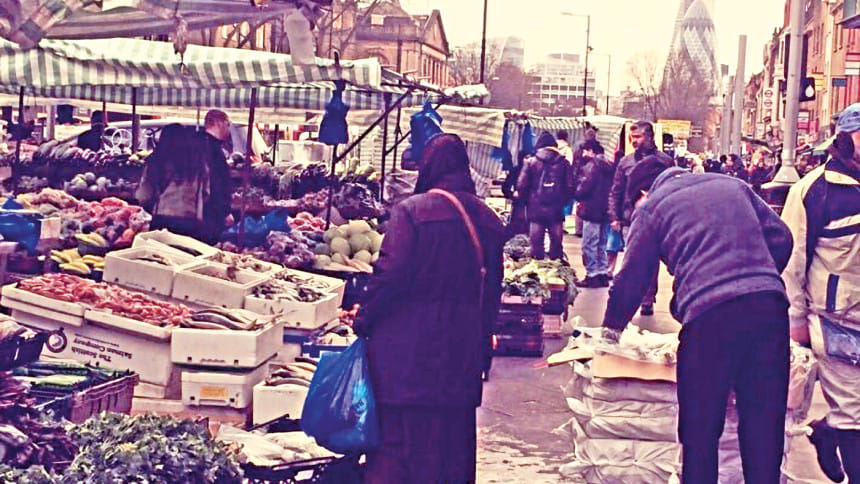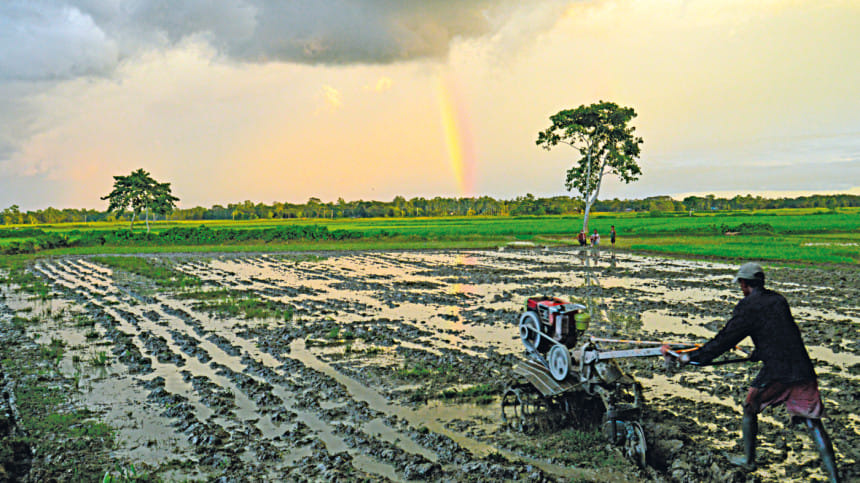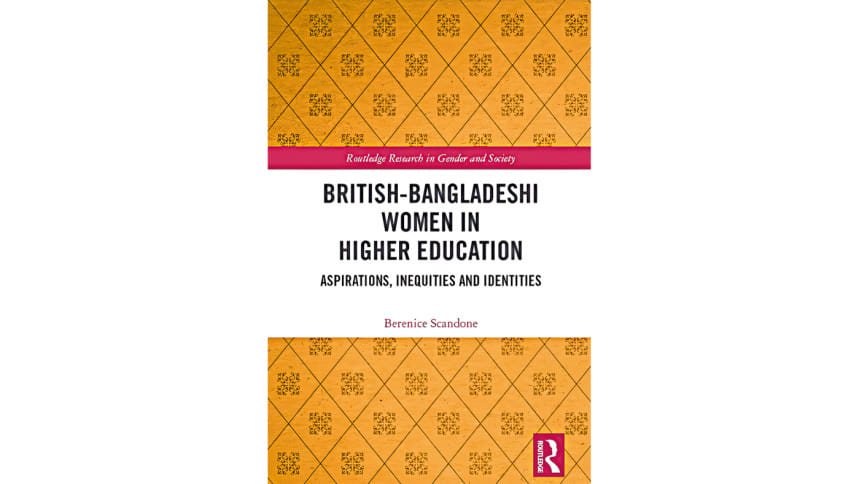In recent years, British-Bengali women have made significant strides in higher education, challenging stereotypes and overcoming systemic barriers. Drawing on in-depth interviews, this article delves into their journey, highlighting the challenges and achievements of these young women as they navigate their way through university and beyond.
The Bangladeshi diaspora is one of the largest, spanning across various countries including the UK, the US, Canada, Australia and Italy. In the UK, the Bangladeshi community has grown considerably since the mid-20th century. According to the 2021 Census, there were 652,535 residents of Bangladeshi origins, accounting for around 1% of the total population. Most live in the once-industrial London's East End and North England cities of Birmingham, Oldham, Luton and Bradford, where Bangladeshi immigrants hailing mainly from Sylhet, Chittagong and Comilla found employment in the second post-war period. The 1970s textile industry collapse left many unemployed while others turned to the restaurant trade, with 'Indian' restaurants becoming a staple by the early 2000s. Despite facing high levels of income poverty and employment challenges, this community has shown remarkable resilience and has made notable advancements in education and employment.
For many young women, university life fostered intellectual and political engagement, and a heightened awareness of social and racial justice issues, which contributed to re-evaluating their Bengali heritage.
Over the past three decades, the school achievement of pupils of Bangladeshi background has surpassed that of white British pupils and the number of those accessing university has increased at higher rates than for those of white British background. While educational attainment has improved, British-Bengali women continue to face unique challenges. Despite high aspirations, they often encounter barriers in higher education and the job market. These include higher university dropout rates, and difficulties securing high-paying jobs even with comparable qualifications to their peers. Common misconceptions attribute these challenges to cultural and religious norms, but the reality is far more complex. In-depth interviews with 21 British-Bengali women attending universities in London reveal a diverse range of experiences. These young women, aged 18-24, spoke about their aspirations, challenges, and the interplay of class, ethnicity, and gender in shaping their journeys.
For these women, attending university was a natural and expected part of life, regardless of their parents' educational and professional backgrounds. Their families and communities also shared and supported this expectation. Chandi, who pursued a BSc in Economics, said for example: "I always thought I would go to university. It's one of the norms of our culture". Echoing this sentiment, Farhan, who studied BA Sociology, explained: "My decision to go to university, it was just kind of a rule… Because education is seen as a very big thing in my family."
Even those who were the first in their family to attend university emphasized the high value that their family placed on education and how this shaped their upbringing.
"[My parents] have always been into education. Even when we were younger, they always encouraged us to work even at home, do extra work and stuff like that. So, I think [university] was just one of those things we were going to go into anyway." (Fauzia, BSc Mathematics)
Despite facing challenges from their minority ethnic background and, for some, their working-class origins, these women saw higher education as key to their personal growth and professional career, a belief that was rooted in their parents' struggles and sacrifices during migration and settlement. In this shared narrative, the value of education is linked to overcoming the difficulties their parents faced and seizing new opportunities. Sultana, studying BA Youth Studies, highlighted her mother's desire for her to take advantage of the educational prospects that her mother lacked due to racial and gender barriers. Kanta and Shirina reflected on their parents' migration hardships, stressing a sense of duty to succeed academically as a tribute to their parents' perseverance.
Experiences of racism and discrimination in the labour market further underscore the necessity of higher qualifications for Bangladeshi women to compete with their white British counterparts. Flora, whose father was a UK-trained doctor, shared that his experiences of racism motivated her to excel academically. Similarly, Sadia and Zainab discussed their ambitions to challenge the white, male, middle-class dominance of certain academic and employment fields by increasing the presence of women of minority ethnic, working-class background.

These narratives highlight a collective determination to pursue university as part of a broader family project for social mobility, drawing on intergenerational experiences and aspirations to achieve better prospects despite significant challenges. Shay's picture representing what it meant for her to be Bengali (Figure 1) illustrates this shared perspective. This picture portrays the Bangladeshi market in Whitechapel, in London's East End, and includes in the back the buildings of 'the City', the financial district of London. Shay explained that this symbolises the drive for upward mobility of those of Bangladeshi origins:
"I had to get the big buildings in the back, so the Gherkin and the Shard. Because obviously we are from a poor background, we are not really privileged, but we can work our way up to the top. We can work, we are determined, and we always want to be at the top … Because in our background Bengalis don't really have that opportunity to get a degree and to get a good career, so coming over here to the UK where you have the opportunity to get a degree, they want to take full advantage of it." (Shay, BSc Pharmaceutical Chemistry)
Family support plays a crucial role in British-Bengali women's educational journey. Many parents, despite having limited educational qualifications, are determined to provide their children with better opportunities. Participants emphasised their parents' emotional and time commitment, and their investment of even very limited financial resources to support their children's education. While those of working-class origins faced additional hurdles, such as financial constraints and limited guidance, they stressed the efforts that their parents made.
"My parents were first generation immigrants, so they barely knew English themselves… But I still remember when it came to homework my dad would hover behind me… they would try and help me as much as they can. They used to put us in after school club… And my brother, when he was struggling, my mum got a Maths tutor… My parents spent their wage." (Sadia, BA Geography)
While higher education is increasingly seen as a norm in the Bangladeshi community, these women's experiences reveal how these norms are evolving. Older relatives play a pivotal role in setting educational trends, making what was once exceptional now common and valued. Beyond family, social networks like teachers, education practitioners, and friends significantly influence educational aspirations by providing information and motivation. For those who are the first in their families to study at university, this support system is especially vital.

Despite high aspirations, British-Bengali women often face significant challenges in higher education and beyond. They are less likely to attend prestigious universities and more likely to drop out than their white British peers. Even when they graduate, they often find themselves in jobs that do not match their qualifications. Participants from working-class families highlighted the additional challenges they faced compared to other students in accessing learning resources like course materials and private tuition. The lack of teaching staff of minority ethnic origins within universities also affected these women's experiences, by influencing the ideas and discourses that students encountered.
Differential access to resources and perceptions of fit shaped these young women's career aspirations, expectations and pathways, often along lines of class, race, and gender. Known routes and the experiences of similar individuals—by gender, class, race, ethnicity, and religion—made certain pathways more visible and feasible. Schools and universities played a crucial role by providing access to information, contacts, and experience essential for actualizing these aspirations. Yet, anticipating discrimination based on gender, class or ethnicity could deter these women from certain types of job.
Notwithstanding these challenges, the women I spoke with demonstrated resilience and adaptability. They negotiated their identities and aspirations within the framework of their cultural and familial expectations, often finding innovative ways to balance professional ambitions with personal responsibilities. Educational institutions are also pivotal to these women's experiences. Schools and universities that provide supportive environments and foster inclusivity can make a significant difference in their academic and personal development.

For many young women, university life fostered intellectual and political engagement, and a heightened awareness of social and racial justice issues, which contributed to re-evaluating their Bengali heritage. Kanta exemplifies this shift, saying: "Now, when I get more involved in social activism and issues of social justice, I always remember the colonial parts of Bangladesh. And when I remember it, I feel like that's something I can't let go of and I have to keep hold of that part of my identity."
This process of re-evaluating their Bengali origins was common among the women interviewed, supported by the accumulation of social and cultural resources and increased reflexivity through higher education. Sadia's experience and the picture representing what it meant for her to be Bengali (Figure 2) illustrate this journey.
"When I was young, I used to really like [henna] and I'd always want to wear it, then during my teenage years I was kind of embarrassed by it, and now again I really like putting it on, and I think that also reflects my attitude towards the Bengali culture… I really want to re-claim my culture. I think just learning about it in terms of society that we're in, just reading… you have all these people of colour embracing their culture, and it's more liberating when you own it."
Jamila's narrative underscores the importance of peer networks and engagement with other British-Bengali students in promoting interest in one's cultural background. Her involvement in the university's Bangladeshi Society deepened her appreciation for her heritage, leading her to visit Bangladesh after ten years. She explained: "Only recently I've started learning more about Bangladeshi history, its culture, and accepting that I'm Bangladeshi and being proud about it". About the picture representing what it meant for her to be Bengali (Figure 3), she said: "That picture for me represents sort of home in a sense, and not forgetting our ties with it".

These women's narratives evidence how, for young people of minority ethnic origins, university environments can foster a sense of pride and connection through social and intellectual engagement.
The achievements of British-Bengali women in higher education are a testament to their determination and resilience. However, there is still much work to be done to address the structural inequities that hinder their full potential. Policy makers, educational institutions, and communities must work together to create an environment where these young women can thrive. The journey of British-Bengali women in higher education is a powerful narrative of aspiration, resilience, and transformation. By understanding and addressing the unique challenges they face, we can pave the way for more inclusive and equitable societies.
Berenice Scandone is a Research Fellow at the Polytechnic University of Milan (Italy).


Comments